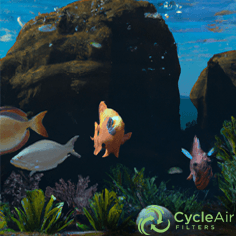
Which Marine Life is Most Impacted by Plastic Pollution?
| Scott C
Marine life is heavily impacted by plastic pollution, which is a growing problem in the oceans worldwide. Plastic pollution can harm marine animals in a variety of ways, from entanglement to ingestion. In this blog post, we will detail the marine life most affected by plastic pollution and explain how it is impacting them.
Sea Turtles:
Sea turtles are particularly susceptible to plastic pollution as they often mistake plastic bags for jellyfish, a primary food source. Once ingested, plastic can block the turtle's digestive system, leading to starvation or suffocation. Additionally, plastic bags and other debris can become tangled in sea turtles' fins and flippers, making it difficult for them to swim and breathe.
Seabirds:
Seabirds, such as albatrosses and petrels, are also heavily impacted by plastic pollution. Plastic debris, particularly small pieces such as plastic pellets, can be mistaken for food by these birds, leading to starvation or suffocation. Additionally, plastic debris can become entangled in the birds' wings and legs, making it difficult for them to fly or move about.
Marine Mammals:
Marine mammals, such as dolphins, porpoises, and whales, are also heavily impacted by plastic pollution. Plastic debris, particularly fishing gear such as nets and lines, can become entangled in these animals, leading to suffocation or injury. Plastic debris can also be ingested, blocking the animal's digestive system and leading to starvation.
Fish and other marine invertebrates:
Fish and other marine invertebrates, such as crabs and squid, can also be impacted by plastic pollution. Plastic debris can be mistaken for food, leading to ingestion and potential injury. Additionally, microplastics, tiny particles of broken-down plastic, can be ingested by these animals and accumulate in their tissues, potentially harming their reproductive systems and affecting the entire food chain.
In addition to these examples, many other marine species such as sharks, coral and seagulls also affected by plastic pollution. Plastic debris can suffocate or starve them and harm their reproduction.
The problem of plastic pollution in the oceans is a critical one, and it is essential that we all do our part to reduce our plastic use and properly dispose of plastic waste. By reducing single-use plastics, properly disposing of trash, and supporting plastic reduction and recycling efforts, individuals can help to reduce the amount of plastic pollution in the oceans and protect marine life. It's also important for industries and governments to take steps to reduce plastic pollution, such as implementing policies and regulations, increasing recycling and waste management infrastructure, and increasing awareness about the issue.
Plastic pollution is a complex and persistent problem, which needs collective action to tackle. It's time for everyone to take the responsibility and be part of the solution. Together, we can protect the marine life from the devastating effects of plastic pollution. Cycle Air Filters offer a solution to help you contribute to a reduction in your own plastic waste. Traditional HVAC air filters for furnace and A/C are single use and need replacing, usually every 3-4 months. By switching to a reusable air filter like Cycle Air, you can remove the equivalent plastic of 105 water bottles per year. Cycle Air is made of 100% recycled plastics but also stops the consumption of single use going forward. Click here to learn more!

Leave a comment
Your email address will not be published.